Every PC needs a quality antivirus (opens in new tab), but why stop there? Bitdefender Antivirus Plus is a top-notch Windows malware hunter, but as the ‘Plus’ suggests, it goes so much further, shielding your system from harm with more protective layers than many security suites.
There’s market-leading anti-phishing, for instance. Multi-layered ransomware protection (opens in new tab). Network attack prevention, banking protection via a secure browser, secure file deletion, a vulnerability scanner and a password manager.
Antivirus Plus also gets you the free version of Bitdefender VPN. It’s very limited – you’re restricted to 200MB data a day and can’t choose a location – but, surprisingly, even that’s better than some competitors. (Avira’s free VPN also doesn’t support choosing a location, and only gives you 100MB data a day.)
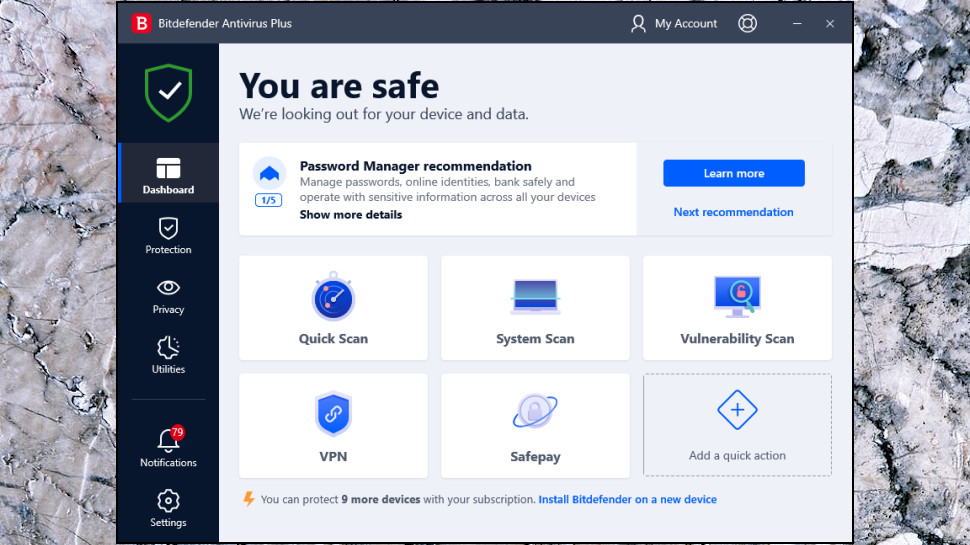
Bitdefender Antivirus Plus: Plans and pricing
Bitdefender Antivirus Plus is reasonably priced for a Windows antivirus at $23.99 to cover three devices for the first year, $59.99 on renewal. Norton Antivirus is a similar $19.99 in year one, $59.99 on renewal, but only covers a single device. Avast Premium Security’s single PC license is $39.99 in year one, $77.99 on renewal.
If you’re looking for more power, Bitdefender Internet Security is essentially Antivirus Plus, but with a firewall and parental controls. It’s only a fractionally more expensive at $29.99 in year one to cover three devices, though leaps to $89.99 on renewal.
Bitdefender Total Security adds Mac, Android and iOS protection, and throws in a Device Optimizer to improve performance. It’s only a few dollars more – $34.99 in year one, $94.99 on renewal – but covers up to five devices, making Total Security a better deal overall.
If you need a VPN and value is a priority, there are some competitive deals elsewhere. Norton 360 Standard offers excellent security, includes a full VPN and covers up to 3 PCs, Macs, tablets or phones for $39.99 in the first year, $89.99 on renewal. And Avast One Individual is a quality suite with an unlimited VPN, and covers up to 5 devices for $39.96 in the first year, then $99.99.
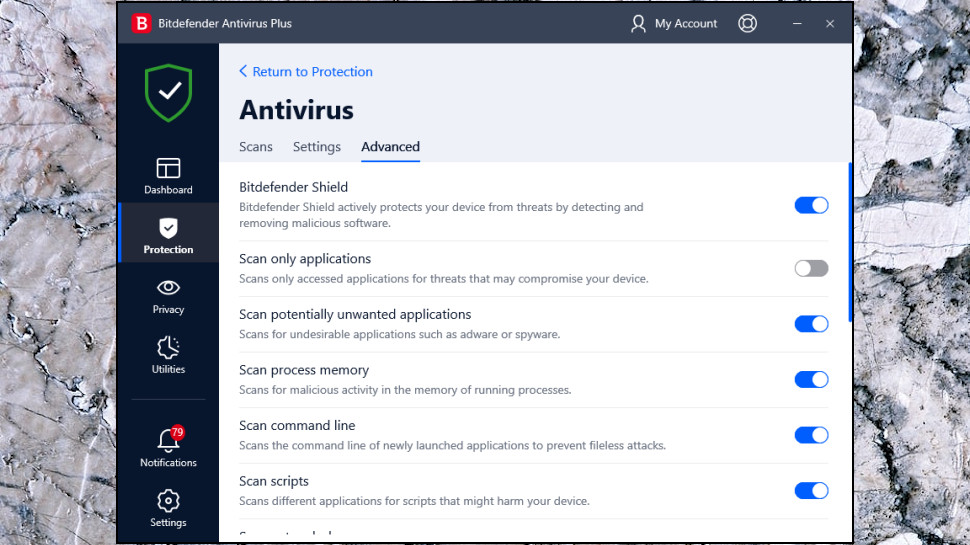
Bitdefender Antivirus Plus: Getting started
Hand over your cash, create a Bitdefender account and you’re directed to Bitdefender Central, the company’s web dashboard. This is where you can view your subscriptions, download the apps you need, and monitor all your devices once they’re properly set up. It’s all very straightforward, and we had Antivirus Plus up and running within minutes.
Bitdefender’s straightforward interface clearly presents its various features using large icons, with text captions, and simple descriptions to help you understand what to expect from each function. Even security newcomers should quickly find whatever they need.
The interface is surprisingly configurable, too. The main dashboard has a Vulnerability Scan button, for instance, but if you never use this, it’s easy to change. Just a couple of clicks and you can replace it with a launcher for the Safepay secure browser, the File Shredder, or something else you’re more likely to use.
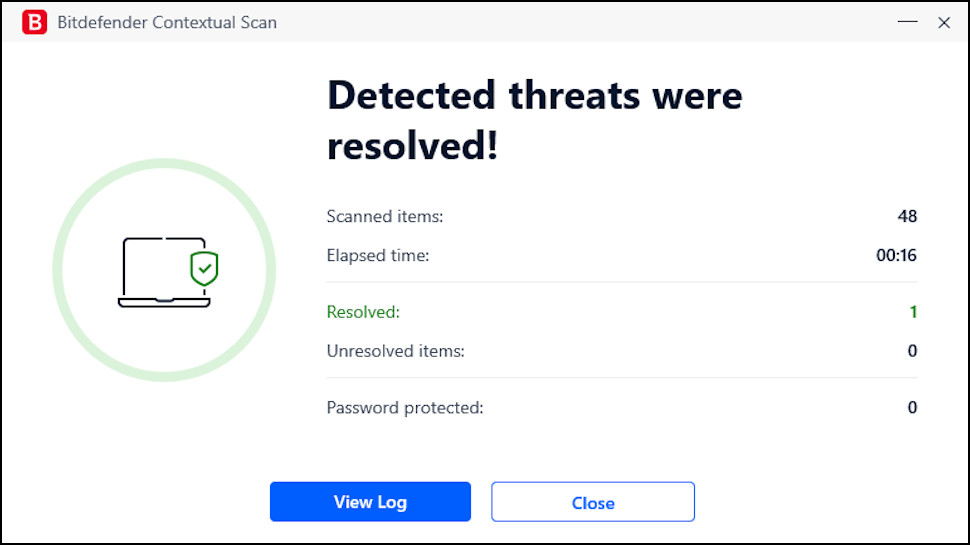
Bitdefender Antivirus Plus: Scanning options
Bitdefender Antivirus Plus automatically scans files as you download, access or launch them, which means there’s usually no need to run manual scans. But if you’re looking for some on-demand reassurance, you can run Quick or Full System scans direct from the interface, or scan selected files, folders or drives from Explorer’s right-click menu.
A bonus Vulnerability Scanner checks your system for missing updates, insecure Wi-Fi and poorly configured security settings. This gave mixed results in our tests. We turned on AutoRun for all drives, and the scanner detected this and warned us of the security risks. But it also claimed a network was ‘unsecure’ because it didn’t have a password, when this simply wasn’t true.
Scanning isn’t always fast, but improves dramatically over time. A Quick Scan of our test system took 7:39, for instance, while some products are finished in seconds. Scanning a test 50GB of executables took an above-average 35:30 on the first run, but as Bitdefender only scans new and changed files, our second scan was done in a little over a minute.
This is all hugely configurable. Experts can decide exactly what they’d like to scan, or not (network shares, archives, scripts, more.) You’re able to create custom scans to check this drive, those folders, anything else you like, with your preferred settings, even scheduling scans to happen when you’re not around.
You can even reboot Bitdefender in its own custom Rescue Environment, rather than Windows, allowing the product to detect and remove stubborn threats that can’t be defeated in other ways.
It’s an excellent range of options, but if you prefer a simpler life, you can ignore them all, leave Bitdefender running in the background, and it’ll still do a fine job of detecting any threats.
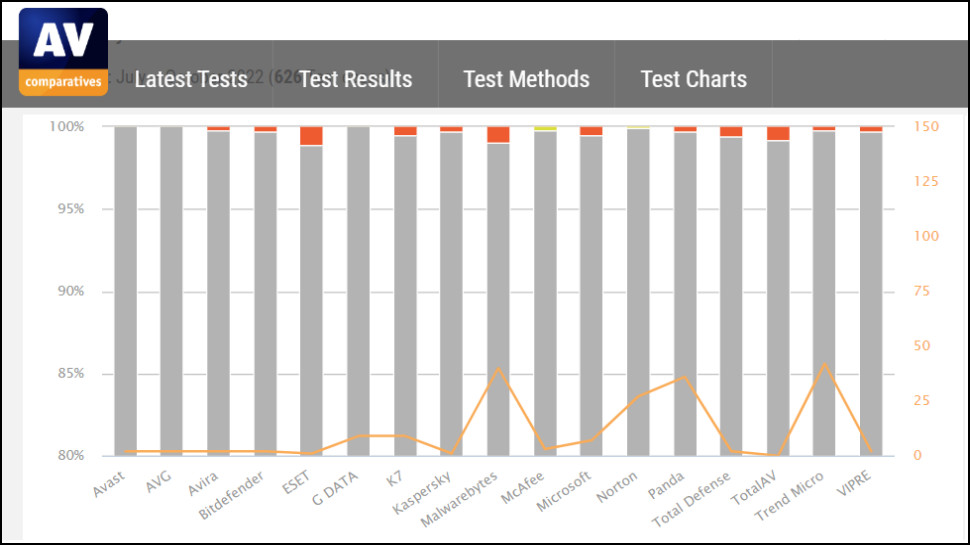
Bitdefender Antivirus Plus: Antivirus Lab Test Results
Bitdefender products are regularly assessed by all the big independent antivirus testing labs. We look at the results of some of the most important tests to get a feel for how an antivirus performs.
AV-Comparatives’ Real-World Protection and Malware Protection reports show how effectively a security product can block internet or file-based attacks. Bitdefender ranks equal 6th out of 17 (with Kaspersky and VIPRE) for Real-World Protection, 10th for Malware Protection. These aren’t great results, but keep in mind they’re based on tiny differences. The company protected against 99.98% of threats in the Malware Protection test, for instance, a pretty decent result. It just so happens that G-Data, Avast and McAfee all managed a perfect 100%.
AV-Test’s Windows Home User report delivered better news, with Bitdefender blocking 100% of test threats.
Both AV-Test and AV-Comparatives give awards for their top products across their main tests. Bitdefender scored a maximum five in their most recent reports, equal first with Avast. We also checked performance over time by looking at the AV-Comparatives awards won by the company in 2022. This time Bitdefender topped the list with seven, just edging out Avast’s six, and a little ahead of Avira and McAfee (both five.)
The good news continued with SE Labs, where Bitdefender managed 100% Total Accuracy in its Home User Endpoint Security test. MRG Effitas’s last 360° Assessment report similarly found Bitdefender blocked every test sample it faced.
If there’s a catch here, performance tests suggest Bitdefender has more impact on a PC’s speed than most. AV-Comparatives’ last Performance Test placed the company 12th out of 17 for performance impact, while PassMark put it 13th out of 13. Although that’s a concern, we didn’t see any significant performance drop on our test PC. Results will vary depending on your devices and how you use them.
That’s a lot of data to consider, so to help make sense of it all, we’ve created a system which takes the AV-Comparatives, AV-Test, SE Labs and MRG Effitas figures, and converts them into a single score between zero and ten.
Bitdefender ranked a decent 6th place out of 15 in our overall chart with 9.94. That’s fractionally behind G Data (9.98), Kaspersky (9.98), McAfee (9.96), Norton (9.96) and Avast (9.95), though ahead of names like Avira (9.93), ESET (9.90) and Trend Micro (9.68.)
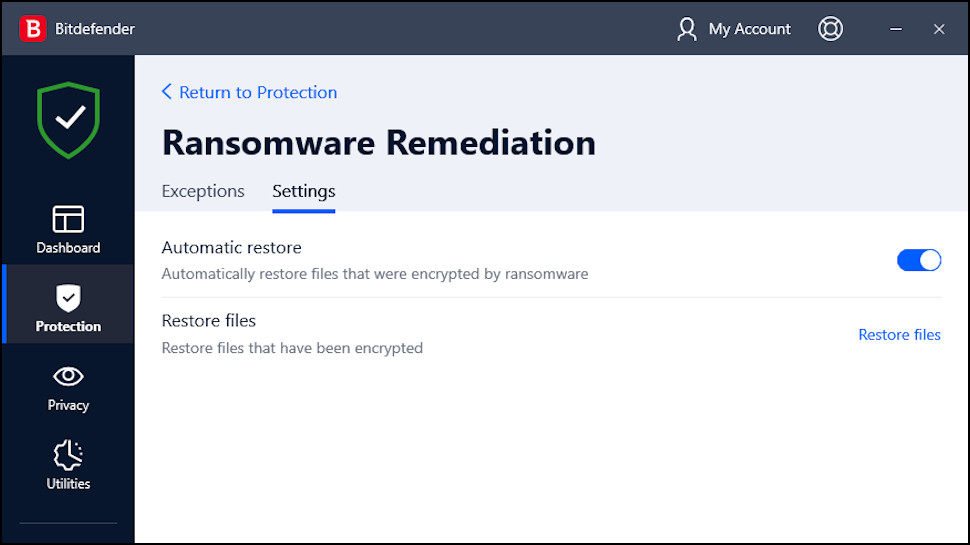
Bitdefender Antivirus Plus: Ransomware
Ransomware is one of the most deadly threats around, but Bitdefender uses a multi-layered approach to keep you safe.
Initial file detection spots and blocks known threats before they can run. If that fails, behavior monitoring raises the alert whenever a process takes ransomware-like action. Even if something extra-stealthy manages to encrypt a little data before it’s killed, Bitdefender’s Ransomware Remediation steps in to back up the files first, then restores them once your system is disinfected.
AV-Test’s Advanced Threat Protection Test looked at how 29 security packages handled ransomware. Bitdefender scored a perfect 40 points, along with several other vendors (Ahnlab, Avast, Avira, Microsoft (Defender), Microworld, PC Matic and Trend Micro.)
MRG Effitas’s third quarter 2022 360° Assessment report was equally positive, finding Bitdefender automatically blocked all 92 ransomware samples.
Lab reports are important, but we also like to find out more about a product by running further tests of our own. That’s why we’ve developed our own custom ransomware. This can’t be detected by a file signature as it’s never been seen in the wild, so an antivirus has to use smart behavior monitoring to keep us safe.
Bitdefender has always stopped our ransomware in the past, but not this time: it sat by as the threat successfully encrypted thousands of files. That’s disappointing, and some products do better (Avast and Norton blocked our sample before it could do any harm.) But we also don’t consider failing this test to be a major black mark for any vendor. It’s more important that an antivirus blocks real ransomware, and the independent testing labs agree that Bitdefender does that very well indeed.
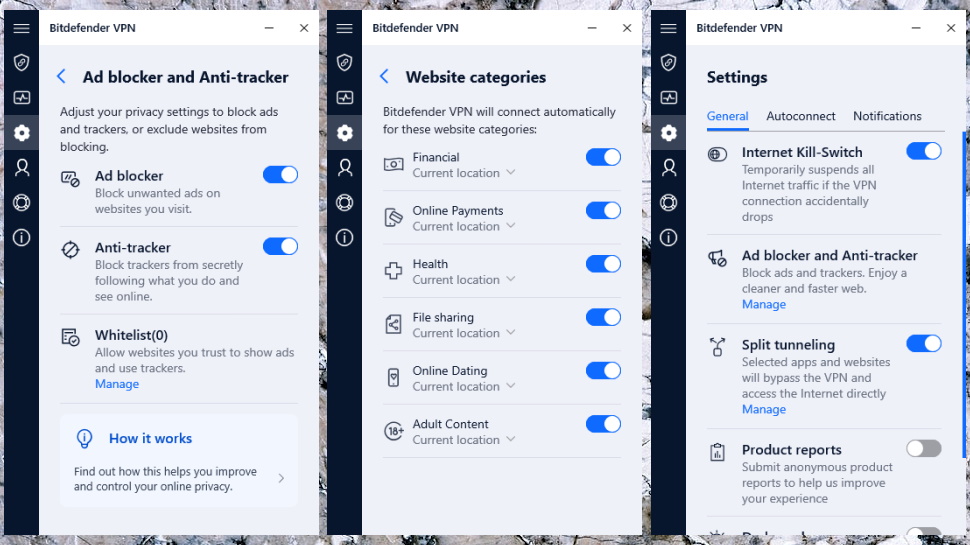
Bitdefender Antivirus Plus: Limited VPN
All Bitdefender security tools from Antivirus Plus up include the company’s VPN (opens in new tab), and the website is keen to spell out the advantages: ‘With Bitdefender VPN, you can stop worrying about privacy on the web. It protects your online presence by encrypting all Internet traffic.’
This is sort-of true, but there’s a very big catch: you only get the limited version of the VPN, which doesn’t allow you to choose a location (it automatically connects to the faster server only), and protects only 200MB of traffic a day.
We turned on the VPN and browsed eBay, Amazon and a few news sites to get a feel for how long this might last, and the meter ran out after around 30 minutes. This could still be enough to cover the bare essentials, maybe checking your email or accessing work resources a few times a day over public Wi-Fi, but not much else.
Still, if you can live within the tight data limits, Bitdefender VPN isn’t a bad service. It’s easy to use, with a decent set of features (ad and tracker blocking, split tunneling, more.) Our testing found the kill switch does a reliable job of protecting your privacy, stepping in to block your internet if the VPN connection drops.
Bitdefender VPN uses the Hotspot Shield network underneath, and this delivered a below average 160-410Mbps in our most recent speed tests. But that’s not a big deal for occasional VPN use, and even that 160Mbps should be just fine for general browsing.
The apps also have an unusual highlight in an excellent set of Autoconnect tools. You could have the VPN automatically connect when you accessed your work network, for instance, or whenever you visited websites in a specific category (financial, say, or online payments.) That’s not just a convenient time-saver, it also helps ensure you only use the VPN when absolutely necessary, helping you stretch your tiny data allowance a little further.
Overall, Bitdefender VPN does add some value, even in its limited form. But if you’re looking for a security suite with more VPN power, there are other options.
The free Avast One Essential also doesn’t allow choosing location, but it has a far more generous 5GB a week data allowance.
Norton 360 Standard ($40 in year one, $90 afterwards) includes Norton Secure VPN for a single device, while Norton 360 Deluxe ($50 in year one, then $110) and higher offer full protection for up to five devices.
Alternatively, Avira Prime includes every Avira product, including its full VPN, for $60 in year one, $100 afterwards.
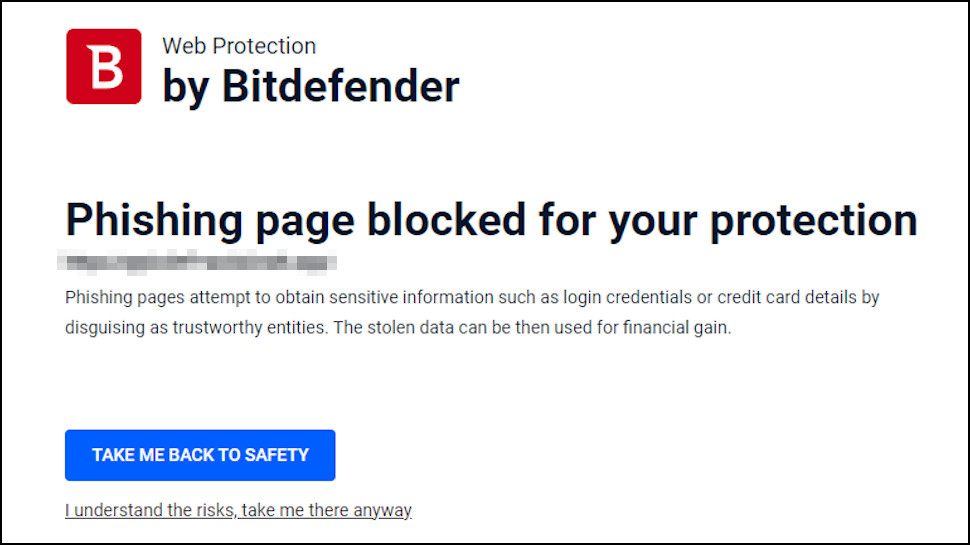
Bitdefender Antivirus Plus: Web protection
Bitdefender’s Web Protection blocks access to phishing and other malicious sites, reducing the chance that you’ll be caught out by dangerous links in your inbox or social feeds.
It’s a very effective system. We put together a list of 1,033 brand-new phishing links, and Web Protection blocked 88% of them. Avast also has quality anti-phishing, but it couldn’t quite match Bitdefender, only blocking 83%.
AV-Comparatives’ 2022 Anti-Phishing tests found broadly similar results: Bitdefender came equal first with Avira, each blocking 96% of threats, while Avast followed just a little behind with 93%.
There is one potential problem: Web Protection doesn’t work if the VPN is on. That’s not an unusual issue, but we suspect it’s also a compromise that most users won’t realize they’re making.

Bitdefender Antivirus Plus: Safepay
Bitdefender Safepay is a secure browser which aims to protect your online banking, shopping and other activities from snoopers. We’re not just talking about external attacks: it also tries to prevent malicious apps running on your own system from monitoring your web usage.
Safepay doesn’t support third-party extensions as they’d be a security risk, but Bitdefender has added a few of its own. It integrates with Bitdefender’s password manager, handy for avoiding the need to remember your banking and e-store credentials. A built-in pop-up blocker keeps some browsing dangers at bay. There’s also a simple virtual keyboard where you can enter text using your mouse rather than typing, helping to protect you from even hardware keyloggers.
Although the lack of features means you won’t want to use Safepay as your main browser, Bitdefender works hard to make it easy to use. It can pop up notifications suggesting you switch to the app when you access a banking site, for instance, and optionally connect to Bitdefender VPN whenever Safepay launches.
Our tests showed Safepay works very well. Screen capture tools couldn’t ‘see’ Safepay’s screen. Our custom keylogger wasn’t able to record Safekey keypresses via the device or virtual keyboard. It even prevents leaks via the clipboard: whatever you paste into the clipboard from Safepay, it can’t be viewed from any other process.
This still may not be a convenient system to use. If you have Dashlane (opens in new tab) or some other password manager’s extension in your regular browser, for instance, maintaining the same details in Bitdefender is a hassle. But the extra protection you get could make it worthwhile in some situations.
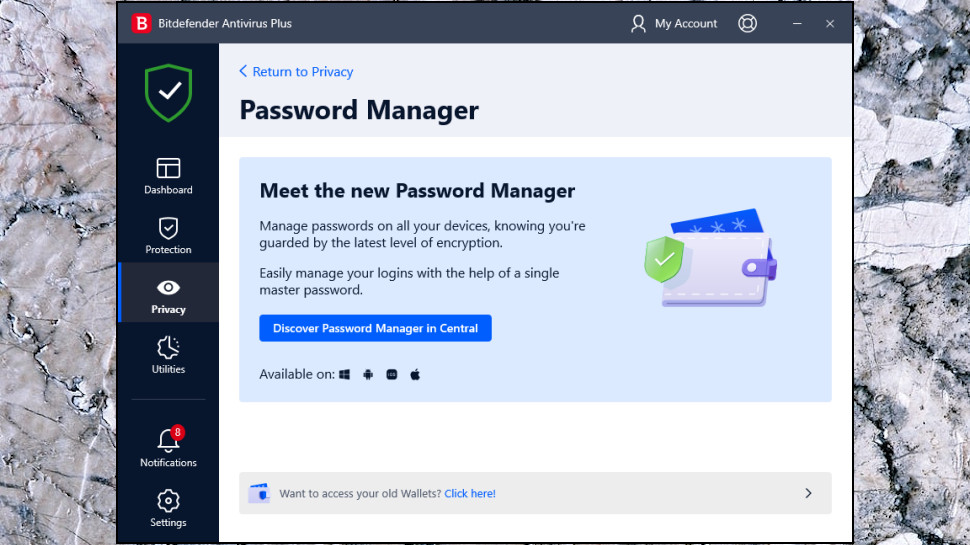
The Bitdefender website makes it clear that Antivirus Plus includes a password manager (opens in new tab), so we were surprised to see the app display a large banner suggesting that we buy one. What’s going on?
Fortunately, we didn’t have to part with any cash. Bitdefender Antivirus Plus still comes with the same Wallets password manager it’s had for years. It’s more capable than you might expect, too, with options to capture and autofill usernames and passwords, credit card numbers and identity information (name, data of birth, address, phone numbers), as well as securely store subscription information, email account details and more.
Unfortunately, Wallets is also a little short on features. It’s only available as a browser extension (there’s no stand-alone app for mobile devices), and even then, Wallets’ browser support is a little dated. It automatically integrates with Internet Explorer, for instance, but you can’t use Wallets with Edge.
If your needs are simple, you could continue with Wallets, at least for now. But that’s risky. Bitdefender is doing its best to push users to the new product, which suggests to us that Wallets may not be around for much longer.
Alternatively, the new Bitdefender Password Manager is more capable and up-to-date, with Android and iOS apps, and browser extensions for Chrome, Firefox, Safari and Edge. Support for a host of file formats and other password managers makes it easy to import your existing logins. The first three months are free, and after that it’s priced from $1.67 a month in year one, $2.50 on renewal.
If you really need a password manager, though, it might be worth upgrading to Bitdefender Premium Security. This includes everything you get in Antivirus Plus, and adds the password manager, the unlimited VPN, parental controls and more. It also protects any mix of up to 10 Windows, Mac, iOS and Android devices.
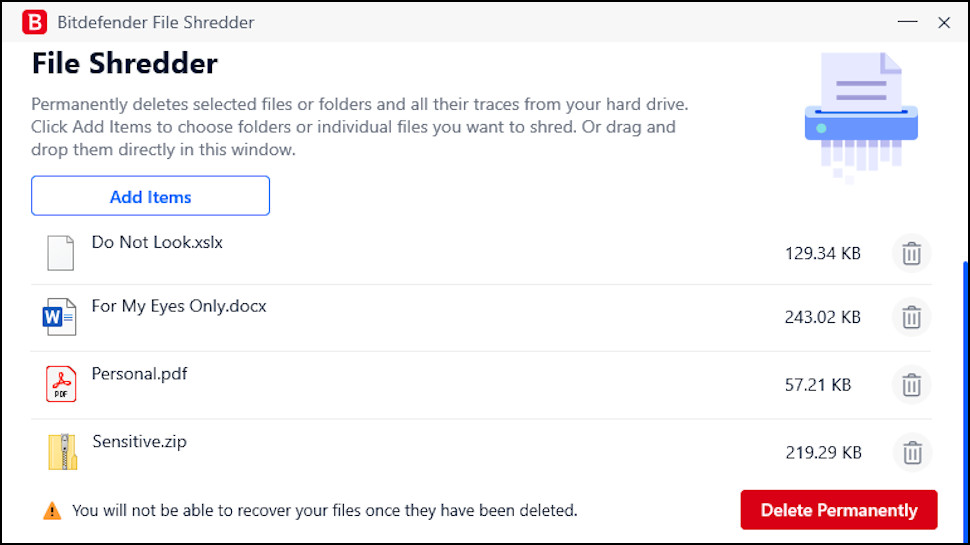
Bitdefender Antivirus Plus: Bonus features
If you’re thinking we’ve discussed plenty of Bitdefender Antivirus Plus features so far, you’d be right- but browse the menus and there’s even more to be discovered.
Anti-tracking support aims to reduce your online tracking when using Chrome, Edge, Firefox and Internet Explorer. It’s a decent idea, but the feature isn’t enabled by default, and we suspect many users will never realize it’s available. Support for Opera, Brave and other smaller browsers would be welcome, too, although if you use the VPN then that also has decent anti-tracking (it blocked 83% of a sample list of trackers in our tests.)
A File Shredder securely wipes confidential files to ensure they can’t be undeleted. You can choose individual files from the Bitdefender dashboard, or right-click a file, folder or drive in Explorer and select Bitdefender, Shred. This works, but it’s missing some useful features from more advanced shredders. You can’t change the shredding algorithm to improve speeds or make the feature even more secure, for instance, and there’s no ‘shred unused disk space’ option to effectively wipe all deleted files.
Windows security apps have a reputation for slowing down your system, but Bitdefender’s Profile system aims to help. This automatically monitors what you’re doing and changes system and Bitdefender settings to deliver better results. It’ll improve performance when you’re playing a game, for instance; cut background activity when you’re watching movies; automatically apply energy-saving tricks when you’re running on battery, or ramp up app settings if you’re connected to public Wi-Fi. It’s hard to measure the effectiveness of these tweaks, but there are some useful options here, and we’re glad to see them included in the suite.
Bitdefender Antivirus Plus: Final verdict
It’s dropped fractionally down the rankings with some testing labs, but Bitdefender Antivirus Plus still delivers excellent protection against malware, phishing and other threats, and sweetens the deal with more useful extras than many security suites.
We’ve featured the best internet security suites.





